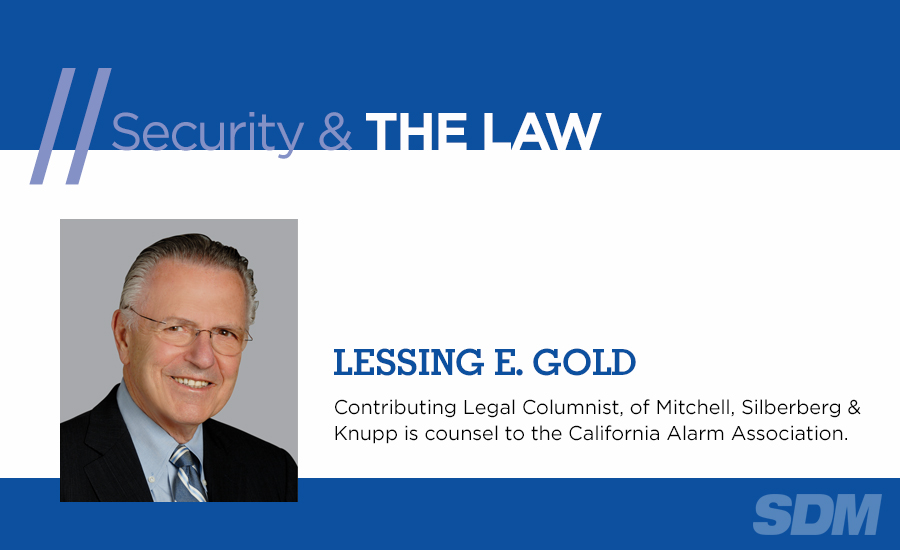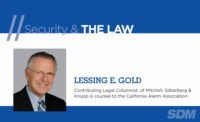Security & The Law
Did Fire Monitoring Service Breach Their Contract?

AN ASSISTED LIVING COMMUNITY consisting of several buildings, one of which was used as a residential personal facility for the elderly, experienced a tragic fire. The sprinkler system was protected by a fire protection monitoring service, which had merged with the defendant. In May 2017, the monitoring service company’s agents, representatives and employees closed several valves on either side of a leaking control valve, but failed to return all of the valves to their fully open positions, thereby preventing water from supplying the fire suppression systems protecting the building. Because the valve tamper switch was not in its proper position, it did not signal that one of the valves was not fully open.
In June, the monitoring service company inspected the fire sprinkler system and reported that all sprinkler main control valves and other valves were in the appropriate or closed position and that all control valves were sealed or supervised in the appropriate position. It also reported two deficiencies in the system but did not mention the control valves or tramper switches.
On Nov. 16, 2017, a fire started in the building and the smoke detectors activated and signaled the local fire and police departments. However, because the monitoring service company failed to properly reopen one of the valves during its previous repair work, the only water that reached the sprinkler heads was residual water in the pipe. Ultimately, the fire spread throughout the building and adjacent connected structures, causing the deaths of four residents, damages to the building, personal property and equipment located in the structures, loss of business income and extra expenses.
The plaintiff, the insurance company, issued an insurance policy insuring the owners and operators of the assisted living community at the time of the fire and had made payments to them in excess of $10,600,000. The plaintiff then filed a subrogation action against the defendant monitoring service to recover payments made to its insured, alleging, among other things, negligence, gross negligence, wanton and willful misconduct and breach of implied warranty.
The defendant filed a motion to dismiss, arguing that the claims should be dismissed pursuant to the gist of the action doctrine because the plaintiff’s claims sound in tort but the duties allegedly breached are in fact governed by the contracts between the parties. The gist of the action doctrine’s purpose is to preclude plaintiffs from recasting ordinary breach of contract claims into tort claims.
To determine whether a fraud claim is barred by the gist of the action doctrine, the court must first assess the alleged breach of the social duty imposed by the law of torts and then compare that breach to the defendant’s contractual obligations under the parties’ agreements. The court stated that it has “long recognized that a party to a contract may be found liable in tort for negligently performing contractual obligations and thereby causing injury or other harm to another contracting party.”
The court indicated that the documents attached to defendant’s motion were not contracts for the services performed because the plaintiff’s insureds did not accept the terms outlined in the documents. The documents themselves indicated that they were given to the plaintiff’s insureds only after the various services had been fully performed. Given this assertion and the lack of additional facts, it is certainly plausible that the plaintiff’s insureds did not agree to be bound by the specific terms and conditions printed in those documents.
Even if discovery were to reveal facts showing that the terms and conditions of the attached documents governed the parties’ transaction, the duties contracted for in those documents are not the same as the duties that the plaintiff alleges the defendant breached in this lawsuit. The plaintiff does not allege that the defendant failed to replace the damaged valve or inspect the fire sprinkler system. Rather, the gist of the plaintiff’s claims is that the defendant failed to fulfill those obligations with skill and diligence, and fraudulently mislead the plaintiff.
Therefore, the court was satisfied that tort law governs the duties that the defendant allegedly breached. The defendant’s motion to dismiss was denied.
READERS ASK
Q: Because of the COVID-19 pandemic, my employees work from home. Do I have to provide lunch breaks, rest periods and/or overtime?
A: It’s difficult to answer as it would depend on where you are located. It is generally my understanding that most states would require you to apply the same rules which govern normal working conditions, even though employee is working from home. Therefore, I suggest your employees be provided normal lunch breaks, rest periods and overtime pay if overtime is in fact worked.
I suggest, however, you check your local and state laws to make sure there are no additions or exceptions due to the COVID-19 pandemic.
Looking for a reprint of this article?
From high-res PDFs to custom plaques, order your copy today!






